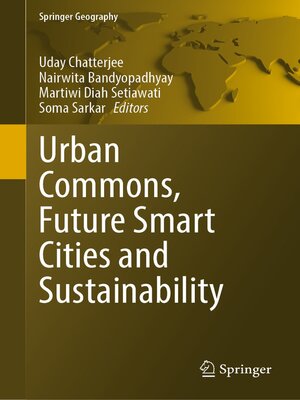
Sign up to save your library
With an OverDrive account, you can save your favorite libraries for at-a-glance information about availability. Find out more about OverDrive accounts.
Find this title in Libby, the library reading app by OverDrive.



Search for a digital library with this title
Title found at these libraries:
| Library Name | Distance |
|---|---|
| Loading... |
This book provides a critical theoretical framework for understanding the implementation and development of smart cities as innovation drivers, with long-term effects on productivity, livability, and the sustainability of specific initiatives. This framework is based on an empirical analysis of 21 case studies, which include pioneer projects from various regions. It investigates how successful smart city initiatives foster technological innovation by combining regulatory governance and private agency. The typologies of smart city-making approaches are thoroughly examined. This book presents the holistic approach of smart cities, which start from current issue and challenges, advanced technological development, disaster mitigation, ecological perspective, social issue, and urban governance.
The book is organized into five major parts, which reflect interconnection between theories and practice. Part one explains the introduction which reflects the diversity andchallenges of the urban commons and its regeneration. Part two covers the current and future situation of urban growth, anglomeration agglomeration, and urban infrastructure. This section includes rethinking urban sprawl: moving towards sustainable cities, drivers of urban growth and infrastructure, urban land use dynamics and urban sprawl and urban infrastructure sustainability and resilience. Part three describes climate crisis, urban health, and waste management. This section includes climate change and health impacts in urban areas, green spaces: an invaluable resource for delivering sustainable urban health, health and wellbeing and quality of life in the changing urban environment, urban climate and pollution—case study, sustainable urban waste management and urban sustainability and global warming and urban heat Island. Part four covers the ecological perspectives, advanced technology, and social impact for i.e., smart building, ecosystem services, society and future smart cities (SSC). This section includes urban ecosystem services, environmental planning, and city management, artificial intelligence and urban hazards and societal impact, and using geospatial application and urban/smart city energy conservation—case study. Part five covers urban governance, smart solutions, and sustainable cities. It includes good governance, especially e-governance and citizen participation, urban governance, space and policy planning to achieve sustainability, smart city planning and management and Internet of things (IoT), advances in smart roads for future smart cities, sustainable city planning, innovation, and management, future strategy for sustainable smart cities and lessons from the pandemic: the future of smart cities.







